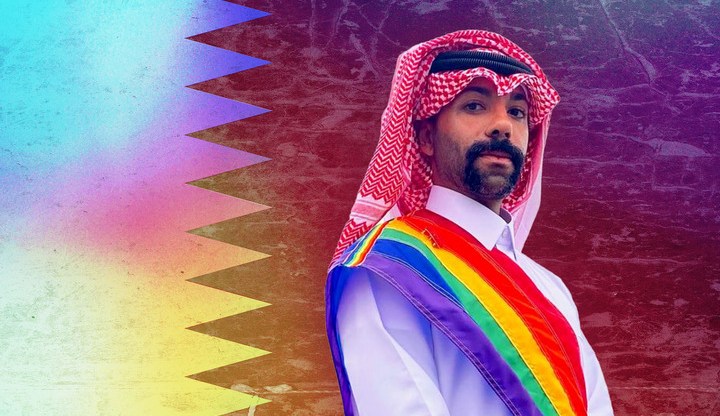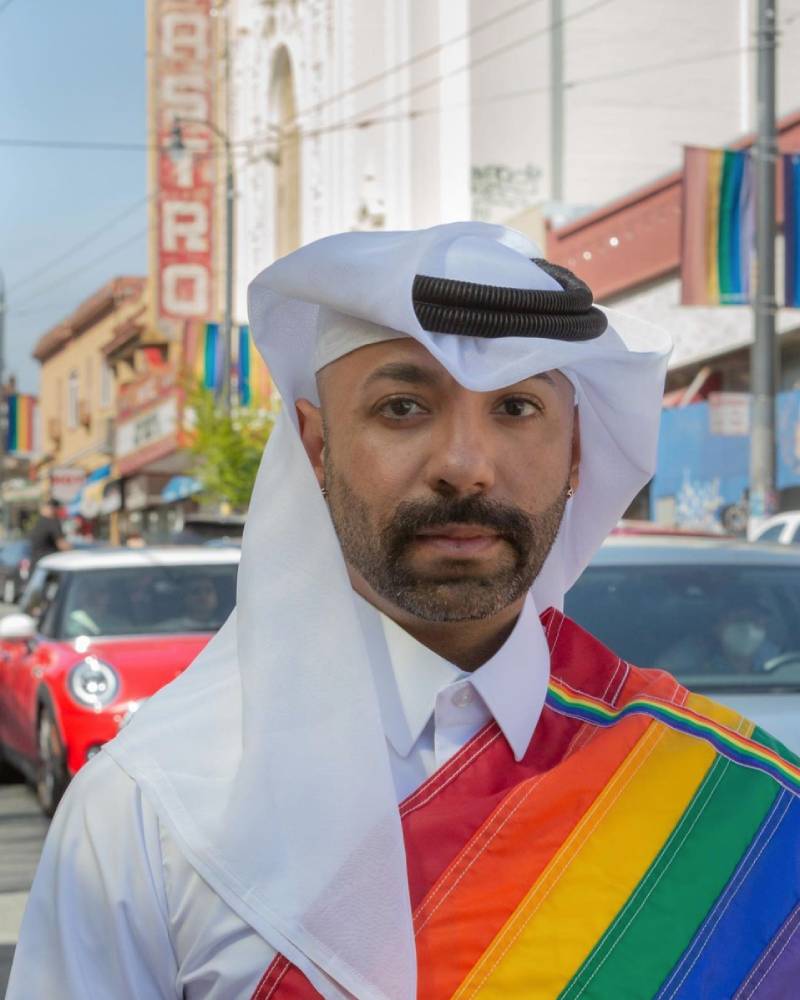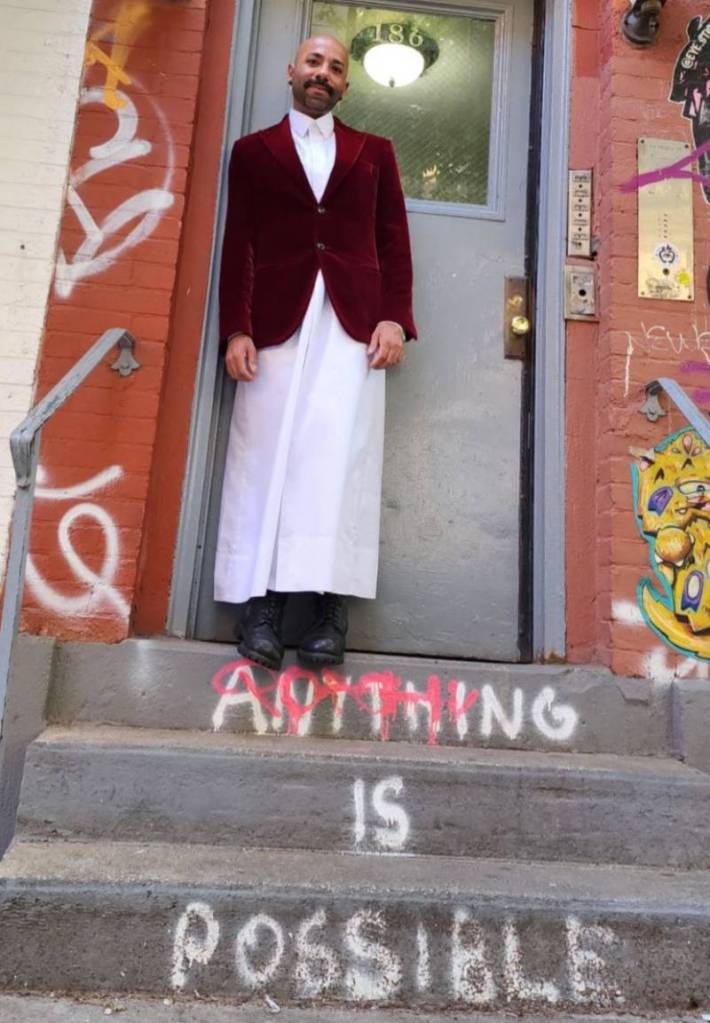Qatar targeting LGBTQ+ people with ‘full blown force’ six months after World Cup, activist says

Dr Nasser Mohamed has been honoured as a grand marshall of San Francisco Pride for his tireless work advocating for LGBTQ+ rights in Qatar and the Gulf Region after the World Cup. (Getty/Instagram/dr._nass/PinkNews)
The men’s football World Cup focused the world’s attention on LGBTQ+ abuses in host nation Qatar. Now, that attention has disappeared and the situation is as bleak as ever, says Dr Nasser Mohamed.
When the World Cup began in Qatar, in November 2022, the BBC took the unprecedented step of ignoring its opening ceremony to focus on the controversies that were threatening to engulf the entire tournament.
“Ever since FIFA chose Qatar back in 2010, the smallest nation to have hosted football’s greatest competition has faced some big questions,” said Gary Lineker, the UK’s most prominent sports commentator.
“From accusations of corruption in the bidding process to the treatment of migrant workers who built the stadiums where many lost their lives. Homosexuality is illegal here. Women’s rights and freedom of expression are in the spotlight.”
It was remarkable, and set the stage for a World Cup in which LGBTQ+ and human rights remained at the forefront of coverage, with protests outside Qatar’s London embassy and the FIFA Museum in Zurich, among other places.
This created a “little spark of hope” for some in the local LGBTQ+ community, US-based Qatari activist Dr Nasser Mohamed tells PinkNews.
Before the World Cup, Mohamed worked with Human Rights Watch on a report about arrests, verbal and physical abuse from authorities towards the community. He says that to some, it seemed this persecution “kind of stopped” during the tournament.

“I didn’t hear anything personally during the World Cup, and then after the World Cup, things kind of continued to be OK,” says Mohamed, who currently lives in San Francisco and is one of the grand marshals of the city’s Pride celebration this year.
“And then all of a sudden, a month and a half ago, bam, it’s all back. Full blown force. Back to arrests. Back to everything. The whole intrusive searches, all of it.”
Sebastian Rocca, founder and CEO of asylum charity Micro Rainbow, says the organisation worked with 1,200 LGBTQ+ refugees and asylum seekers worldwide in 2022 and is expecting to work with a similar number of people this year.
The charity hasn’t had any interactions with LGBTQ+ Qataris in 2022, or thus far this year, something Rocca says signals how “difficult it is for LGBTQI Qataris to seek safety and to leave the country in search of it”.
“This is of great concern to Micro Rainbow,” Rocca says. “Out of the 1200 people Micro Rainbow supported in 2022, there are very few from countries with some of the most punitive laws for LGBTQI people.
“This includes Qatar, but also Mauritania (which also has the death penalty for homosexual sex) and Yemen.
“Despite the cautious optimism after the World Cup and the statements made by the Qatari government, the danger of trying to escape the country and the long arm of the state could mean that LGBTQI Qataris continue to live in hiding.”
In Qatar, LGBTQ+ people are criminalised under the penal code, and consensual same-sex sexual activity is punishable by imprisonment.
The country also operates on an interpretation of Sharia law that criminalises same-sex sexual intimacy between men, and queer men can face the death penalty as a result.
Mohamed says authorities “selectively” target “people that are poor … low to mid class”.
He adds that there isn’t a lot of information available about the true extent of persecution LGBTQ+ people face, it “doesn’t exactly become public”.
Some will see their neighbour be arrested and have “absolutely no idea what even happened”.
“There are all the stories of the ex-pats that get arrested and deported,” he says. “On the spot, they lose their jobs based on their HIV status or based on the fact that they’re LGBT and were found out.
“Do these stories become public now? They’re just kept in a box.”

Mohamed points to “a story trending right now” on “Arabic Twitter”, of a gay, non-binary Saudi influencer, Tariq Aziz, who says they were imprisoned, forced to turn over photos or videos, and subjected to poor conditions for “expressing their ideas and beliefs”.
Mohamed says this lines up with reports of incidents in Qatar, and notes Aziz is coming forward with their story just as the Saudi government posted something saying LGBT tourists are welcome to Saudi Arabia.
“It’s a very similar approach [to Qatar], of trying to keep this PR face for the external world, and then there is the reality of what happens,” Mohamed continues.
On reflection, Mohamed believes some of the coverage that went out around the World Cup “unfortunately didn’t always land right”.
Some felt “exploited” by the attention, he says, while others “pulled back” from engaging out of fear.
“There were some xenophobic narratives that were created, that were Islamophobic narratives that were created and then, at times, it was, unfortunately, more divisive than inclusive,” he says.
“In my opinion, I found the ones that were most helpful were the ones that had people that truly believe LGBT rights are human rights and who were able to be empathetic enough to be in my shoes and describe the experience without creating that wall of fear of the others.
“Because that’s the whole reason the LGBTQ community is persecuted in the first place.”

